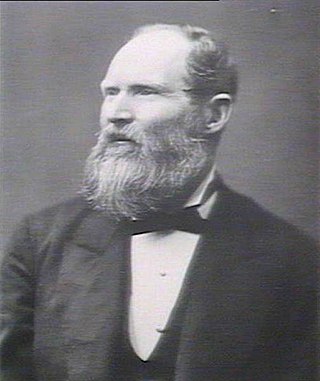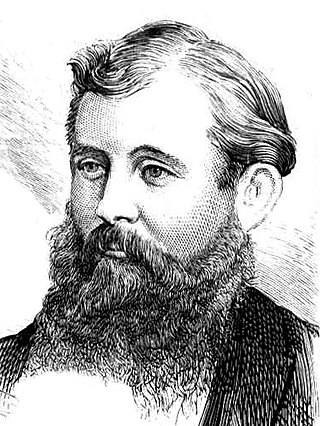Related Research Articles

James Squire Farnell was an Australian politician and Premier of New South Wales. Farnell was a hard-working legislator who gave much study to the land question and also tried hard for some years to pass a bill for the regulation of contagious diseases.
The fourth Robertson ministry was the seventeenth ministry of the Colony of New South Wales, and was led by Sir John Robertson. It was the fourth of five occasions that Robertson led the Government. Robertson was elected in the first free elections for the New South Wales Legislative Assembly held in March 1856.

The fifth Parkes ministry was the 26th ministry of the Colony of New South Wales, and was led by the seventh Premier, Sir Henry Parkes. It was the fifth and final occasion that Parkes was Premier. The title of Premier was widely used to refer to the Leader of Government, but was not a formal position in the government until 1920. Instead the Premier was appointed to another portfolio, usually Colonial Secretary. Having served in the New South Wales Legislative Council between 1854 and 1856, Parkes was elected in the first free elections for the New South Wales Legislative Assembly held in 1856, however resigned from Parliament later that year. He served in the Assembly on several occasions, between 1858 and 1870, being forced to resign on 4 occasions due to his personal insolvency. He came to power as Premier on the first occasion in 1872, serving as Premier for a period of three years. However, Parkes lost the confidence of the Assembly following Governor Robinson's decision to release of the bushranger Frank Gardiner led to the defeat of the ministry in 1875.

Frank Farnell was a member of the New South Wales Legislative Assembly representing Central Cumberland and Ryde for the Free Trade Party.

John Fitzgerald Burns was an Australian politician, member of the Parliament of New South Wales, Postmaster-General in the 1870s and Colonial Treasurer in the 1880s.
Members of the New South Wales Legislative Council who served from 1887 to 1889 were appointed for life by the Governor on the advice of the Premier. This list includes members between the elections commencing on 4 February 1887 and the elections commencing on 1 February 1889. The President was Sir John Hay.
Members of the New South Wales Legislative Council who served from 1885 to 1887 were appointed for life by the Governor on the advice of the Premier. This list includes members between the elections commencing on 16 October 1885 and the elections commencing on 4 February 1887. The President was Sir John Hay.
Members of the New South Wales Legislative Council who served from 1882 to 1885 were appointed for life by the Governor on the advice of the Premier. This list includes members between the elections commencing on 30 November 1882 and the elections commencing on 16 October 1885. The President was Sir John Hay.
Members of the New South Wales Legislative Council who served from 1877 to 1880 were appointed for life by the Governor on the advice of the Premier. This list includes members between the elections commencing on 24 October 1877 and the elections commencing on 17 November 1880. The President was Sir John Hay.
A by-election was held for the New South Wales Legislative Assembly electorate of Cumberland South Riding in November 1856 because the Qualifications Committee declared the August by-election which returned Ryan Brenan was invalid as no poll had been conducted at Canterbury. Brenan was persuaded not to stand to allow Stuart Donaldson to regain a seat, having lost Sydney Hamlets in a ministerial by-election. A committee had been formed to secure the return of Augustus Morris, however it is unclear as to why he was not nominated.
A by-election was held for the New South Wales Legislative Assembly electorate of Newcastle on 12 October 1889 because of the resignation of William Grahame who had financial difficulties.
Bourke, an electoral district of the Legislative Assembly in the Australian state of New South Wales was created in 1880 and abolished in 1904.
Central Cumberland, an electoral district of the Legislative Assembly in the Australian state of New South Wales was created in 1859 and abolished in 1894.
A by-election was held for the New South Wales Legislative Assembly electorate of Central Cumberland on 24 December 1887 because of the resignation of Andrew McCulloch due to insolvency, having assigned his estate for the benefit of his creditors.
A by-election was held for the New South Wales Legislative Assembly electorate of Central Cumberland on 22 June 1889 because of the death of John Linsley.
A by-election was held for the New South Wales Legislative Assembly electorate of Central Cumberland on 6 May 1893 because of the resignation of John Nobbs due to bankruptcy.
A by-election was held for the New South Wales Legislative Assembly electorate of East Sydney on 22 May 1872 because Henry Parkes had been appointed Premier and Colonial Secretary, forming the first Parkes ministry. Such ministerial by-elections were usually uncontested however on this occasion a poll was required in East Sydney and Newcastle, while the five other ministers, Edward Butler (Argyle), James Farnell (Parramatta), Joseph Innes (Mudgee), William Piddington and John Sutherland (Paddington), were re-elected unopposed.
Goldfields West, an electoral district of the Legislative Assembly in the Australian state of New South Wales was created in 1859 and abolished in 1880.
New England, an electoral district of the Legislative Assembly in the Australian state of New South Wales, was created in 1859 and abolished in 1894.
A by-election was held for the New South Wales Legislative Assembly electorate of Ryde on 23 January 1904 because of the resignation of Frank Farnell who had been appointed Chairman of the Fisheries Board.
References
- 1 2 "Mr Frank Farnell (1862-1929)". Former members of the Parliament of New South Wales . Retrieved 22 May 2019.
- ↑ "Writ of election: Central Cumberland". New South Wales Government Gazette . No. 301. 20 September 1889. p. 4039. Retrieved 25 August 2020– via Trove.
- ↑ "In bankruptcy: re Frank Farnell". New South Wales Government Gazette . No. 497. 27 September 1889. p. 6756. Retrieved 28 April 2021– via Trove.
- ↑ "Parliamentary Elections: Central Cumberland". The Daily Telegraph . 24 September 1889. p. 3. Retrieved 28 April 2021– via Trove.
- ↑ Green, Antony. "September 1889 Central Cumberland by-election". New South Wales Election Results 1856-2007. Parliament of New South Wales . Retrieved 26 August 2020.